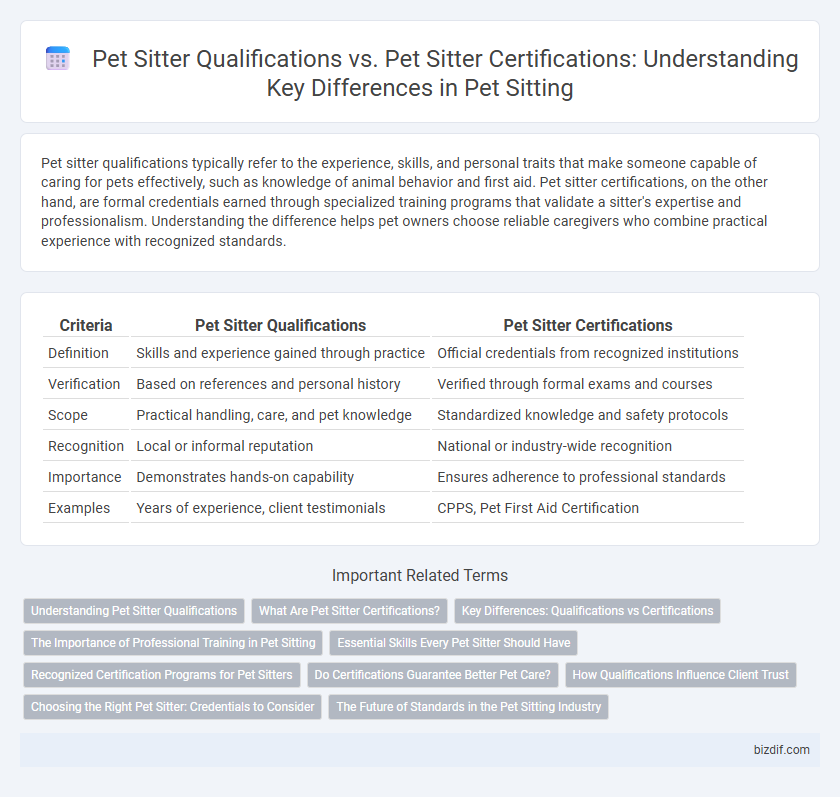Pet sitter qualifications typically refer to the experience, skills, and personal traits that make someone capable of caring for pets effectively, such as knowledge of animal behavior and first aid. Pet sitter certifications, on the other hand, are formal credentials earned through specialized training programs that validate a sitter's expertise and professionalism. Understanding the difference helps pet owners choose reliable caregivers who combine practical experience with recognized standards.
Table of Comparison
| Criteria | Pet Sitter Qualifications | Pet Sitter Certifications |
|---|---|---|
| Definition | Skills and experience gained through practice | Official credentials from recognized institutions |
| Verification | Based on references and personal history | Verified through formal exams and courses |
| Scope | Practical handling, care, and pet knowledge | Standardized knowledge and safety protocols |
| Recognition | Local or informal reputation | National or industry-wide recognition |
| Importance | Demonstrates hands-on capability | Ensures adherence to professional standards |
| Examples | Years of experience, client testimonials | CPPS, Pet First Aid Certification |
Understanding Pet Sitter Qualifications
Pet sitter qualifications encompass a broad range of skills and experiences essential for providing high-quality care, including knowledge of animal behavior, first aid proficiency, and reliability. Certifications, such as those from Pet Sitters International or the National Association of Professional Pet Sitters, validate a pet sitter's expertise but do not replace practical qualifications gained through hands-on experience. Understanding the difference ensures pet owners select sitters who not only hold credentials but also demonstrate comprehensive, real-world competence.
What Are Pet Sitter Certifications?
Pet sitter certifications are formal credentials awarded by recognized organizations that validate a pet sitter's knowledge and skills in animal care, safety, and emergency procedures. These certifications often require candidates to complete specific training programs, pass exams, and demonstrate proficiency in handling various pets, distinguishing certified sitters from those relying solely on experience or informal qualifications. Holding a pet sitter certification can enhance trustworthiness and provide pet owners with assurance of professional competence and adherence to industry standards.
Key Differences: Qualifications vs Certifications
Pet sitter qualifications refer to the skills, experience, and knowledge acquired through hands-on practice and informal training, reflecting a sitter's ability to care for pets effectively. Pet sitter certifications, such as those offered by organizations like Pet Sitters International or the National Association of Professional Pet Sitters, are formal credentials earned by completing specific courses and passing exams demonstrating standardized competency. The key difference lies in qualifications being broader and experiential, while certifications provide recognized, verified proof of professional expertise in pet care.
The Importance of Professional Training in Pet Sitting
Professional training in pet sitting ensures a deep understanding of animal behavior, first aid, and emergency response, which surpasses basic qualifications. Pet sitter certifications validate specialized skills and adherence to industry standards, boosting client trust and pet safety. Investing in certified training programs enhances reliability and demonstrates commitment to high-quality pet care services.
Essential Skills Every Pet Sitter Should Have
Essential skills every pet sitter should have include strong animal handling abilities, effective communication, and emergency response knowledge. Qualifications typically encompass hands-on experience and a genuine passion for animal care, while certifications such as Pet First Aid and CPR provide verified expertise and build client trust. These competencies ensure safe, compassionate care and enhance a pet sitter's professional credibility.
Recognized Certification Programs for Pet Sitters
Recognized certification programs for pet sitters, such as Pet Sitters International's Certified Pet Sitter (PSI-CPS) and the National Association of Professional Pet Sitters (NAPPS), validate a pet sitter's knowledge and skills through rigorous testing and practical assessments. Qualifications often refer to experience and informal training, but certification provides a standardized benchmark ensuring adherence to industry best practices, including pet first aid and safety protocols. Choosing a certified pet sitter guarantees verified expertise and commitment to professional service standards in pet care.
Do Certifications Guarantee Better Pet Care?
Pet sitter certifications demonstrate formal training and knowledge in animal care but do not necessarily guarantee better pet care compared to experience-based qualifications. Many professional pet sitters combine certifications with hands-on experience, ensuring comprehensive skills in handling various pet needs. Pet owners should consider both credentials and practical experience when evaluating a pet sitter's ability to provide high-quality care.
How Qualifications Influence Client Trust
Client trust in pet sitters significantly increases when qualifications such as experience, training, and knowledge in animal care are clearly demonstrated. Unlike certifications, which serve as formal recognition, qualifications provide practical evidence of a pet sitter's ability to handle various pet needs and emergencies. Pet owners prioritize qualifications that showcase hands-on expertise, leading to higher confidence in the sitter's reliability and competence.
Choosing the Right Pet Sitter: Credentials to Consider
When choosing the right pet sitter, prioritize certifications such as CPR and pet first aid, which validate essential skills beyond basic qualifications like experience or love for animals. Certified pet sitters demonstrate specialized knowledge in animal care, behavior, and emergency response, ensuring higher safety and quality services. Reviewing credentials from recognized organizations like Pet Sitters International or National Association of Professional Pet Sitters provides assurance of professionalism and commitment.
The Future of Standards in the Pet Sitting Industry
Pet sitter qualifications often include practical experience and on-the-job skills, while pet sitter certifications provide formal recognition through accredited courses and exams. The future of standards in the pet sitting industry is increasingly leaning toward standardized certifications to ensure consistent care quality and professional accountability. Emphasizing certification frameworks can enhance trust, improve client satisfaction, and promote industry-wide benchmarks for pet care excellence.
Pet sitter qualifications vs Pet sitter certifications Infographic

 bizdif.com
bizdif.com